MIRECC Presents Archive 2020-2021
MIRECC Presents Archive
Evidence-based psychotherapies are now extensively used in VA for treatment of PTSD. A reality for Veterans and for clinicians is that PTSD often co-exists with other conditions such as depression, traumatic brain injury, and substance use. For optimal treatment it is essential to consider how these conditions influence each other and the effectiveness of treatment modalities. This presentation will focus on current trends for the use of evidence-based psychotherapies for coexisting PTSD and substance use disorders, including patterns of utilization and implications for effective clinical care.
Course Learning Objectives:
1. Summarize patterns of utilization within VA of evidence-based psychotherapy, such as PE and PCT, for co-occurring PTSD and substance use disorders (SUD)
2. List common myths about treatment for co-occurring PTSD-SUD
3. Discuss clinical implications for using trauma-focused interventions to treat PTSD-SUD based on nationwide VHA administrative data
May 5, 2021: he Nuts and Bolts of Delivering PTSD Treatment over Telehealth
Leslie Morland, PhD
Ursala Myers PhD
This presentation will enhance clinician knowledge and skills by providing specific focus on the essentials of PTSD telehealth treatment. Enabling clinicians to provide optimal care in support of Veterans who have suffered trauma by providing discussion on the importance of VA clinicians for learning about telehealth modalities to meet the variety of patient needs. Because of the COVID-19 pandemic, telehealth has grown exponentially in VA over the past year. It is important that VA clinicians learn more about telehealth modalities so that they have several options for care delivery that can meet a variety of patient needs. This presentation will focus specifically on the essentials of telehealth treatment for PTSD so that clinicians can continue to provide optimal care during these challenging times for Veterans who have suffered trauma.
Course Learning Objectives:
1. Summarize the evidence supporting the use of telemental health treatment for PTSD
2. Describe how to deliver evidence-based psychotherapy for PTSD via telehealth
3. Identify modifications necessary to deliver treatments during unprecedented times
April 21, 2021: Suicide and PTSD: Navigating Risk and Tailoring Evidence-Based Treatment
Ryan Holliday, PhD
This presentation will enhance clinician knowledge and skills by providing an overview of special considerations in suicide risk assessment with focus on Veterans with PTSD with discussion of evidence-based interventions. Suicide prevention has become a top priority in VA, and enhancing the effectiveness of clinicians in preventing suicide by improving knowledge and professional skills is a major part of that initiative. This presentation will focus on special considerations in suicide risk assessment among Veterans with PTSD, and it will discuss evidence-based interventions for this Veteran population.
Course Learning Objectives:
1. Discuss suicide risk factors among Veterans with PTSD
2. Describe the link between PTSD and suicide using leading theories of suicide
3. Summarize empirically-supported methods of assessing and intervening upon suicide risk within the context of PTSD treatment
April 7, 2021: Clinical Considerations for Treating PTSD and Co-occurring Minority Stress Among LGBTQ Individuals
Nick Livingston, PhD
There has been increasing awareness in VA about the needs of minority Veterans who seek care for a variety of disorders, including PTSD. Minority Veterans often have experienced significant stress related to discrimination and prejudice in society, which is additive to other trauma that precipitated PTSD. In order to enhance clinician knowledge and skills, this presentation will focus on effective screening, assessment and treatment of sexual minority Veterans with co-occurring PTSD and minority stress.
Course Learning Objectives:
1. Describe the impact of trauma, minority stressors, and their co-occurrence on LGBTQ+ individuals
2. Identify screening and assessment tools to inform case conceptualization when working with trauma-exposed LGBTQ+ individuals who also experience minority stress
3. Discuss evidence-based interventions that can be adapted for use with trauma-exposed LGBTQ+ individuals who experience minority stress, and strategies for person-centered care
March 17, 2021: Insomnia: Diagnosis and Treatment
Jonathan Emens, MD
Insomnia is a very frequent condition encountered in all health care settings, and it co-exists with many other mental health conditions. Because it is so frequently encountered and can cause significant morbidity, it is important for clinicians across disciplines to have a good working knowledge of the process of insomnia assessment, along with treatment and referral options. This presentation will provide clinicians with an overview of factors that contribute to insomnia, and it will discuss various assessment and treatment options when encountering a patient with insomnia.
Course Learning Objectives:
1. Summarize factors that predispose individuals to insomnia and perpetuate sleeping difficulty
2. Discuss medical and psychiatric morbidity related to insomnia
3. List pharmacologic and psychotherapeutic treatment options and their expected efficacy
March 3, 2021: Culturally Responsive Case Formulation
Gayle Iwamasa, PhD
Culture is a major component of personal identity and values, and it strongly influences attitudes towards illness and receptivity to medical and mental health care. This presentation will discuss how to incorporate cultural awareness into mental health assessment and care, and will discuss essential elements of a culturally responsive case formulation.
Course Learning Objectives:
1. Define culturally responsive mental health services
2. Explain why VA mental health providers should provide culturally responsive services
3. List integral components of a culturally responsive case formulation
February 17, 2021: Around the Spring: Studies in Bipolar Onset
Sean Stanley, MD
Bipolar Disorder is encountered in a variety of inpatient and outpatient mental health treatment settings, and it can be a challenging condition to accurately diagnose because of the significant variation in symptoms at onset and frequent overlap of symptoms with other psychiatric conditions. This presentation will help clinicians to enhance their understanding of the presentation and natural course of Bipolar Disorder so that treatment approaches can be more accurate and effective.
Course Learning Objectives:
1. Discuss the consistency of Bipolar Disorder diagnoses over time
2. Describe the early course of symptoms in patients later diagnosed with Bipolar Disorder
3. Summarize the evidence for interventions in populations at high risk of developing Bipolar Disorder
February 3, 2021: Cannabis Use Disorder and Withdrawal
Garth Terry, MD, PhD
Cannabis is one of the most commonly used substances and its use now has been legalized in many states. However, cannabis use can lead to abuse and dependence, and adversely affect treatment of, and recovery from, a variety of psychiatric disorders. This presentation will discuss several clinical aspects of cannabis use, including recognition and treatment of cannabis use disorder, cannabis withdrawal, and important characteristics of comorbidity.
Course Learning Objectives:
1. Discuss the symptoms and clinical presentation of cannabis use disorder
2. Describe cannabis withdrawal symptoms and their potential overlap with comorbid clinical disorders
3. Summarize a treatment plan for patients presenting with cannabis use disorder, cannabis withdrawal, and/or cannabinoid hyperemesis syndrome
January 20, 2021: Management of Behavioral Symptoms in Alzheimer’s Dementia
David Mansoor, MD
Alzheimer’s dementia is a common clinical condition among older Veterans. Behavioral symptoms are some of the most difficult symptoms for caregivers and clinicians to manage, and they contribute to morbidity and adversely affect safety. This presentation will discuss effective assessment and treatment of behavioral symptoms, including evidence-based behavioral and pharmacological options.
Course Learning Objectives:
1. Summarize the epidemiology of behavioral symptoms in Alzheimer’s dementia
2. List characteristic target behaviors for treatment of Alzheimer’s dementia
3. Discuss pharmacological approaches to the management of Alzheimer’s dementia
December 16, 2020: Medicolegal Causation in Suicide
Michael Freeman, PhD
Suicide prevention is a core VA goal, and the effectiveness of clinicians in preventing suicide requires both knowledge and professional skills. An important element of improving knowledge and skills includes enhancing awareness of factors that contribute to suicidal behavior. Using a specific case to illustrate the multifactorial nature of suicide causation and prevention, this presentation will examine suicide causation from both medical and legal perspectives.
Course Learning Objectives:
1. Summarize basic principles and steps of a medicolegal causation analysis (INFERENCE model)
2. List important factors that make suicide causation multifactorial
3. Discuss how the causation model is applied to the investigation of a specific suicide case that followed an improperly dispensed medication
December 2, 2020: Morally Distressing Events in Healthcare Workers During the Coronavirus (COVID-19) Outbreak
Sonya Norman, PhD
Unprecedented contexts, such as a pandemic, may cause some healthcare workers to experience morally distressing events -- experiences that contradict personal or shared values or expectations. Feelings resulting from these experiences can include guilt, shame, distress or intrusive thoughts or images, anger, and reduced readiness. This webinar will help mental health providers understand how working in the current pandemic might result in experiences of morally distressing events. Strategies that workers, coworkers, and leaders can use to reduce the potential for morally distressing events and strategies that mental health care providers can use to reduce distress will be discussed.
Course Learning Objectives:
1. Define morally distressing events and understand how the current pandemic may increase the potential for frontline healthcare workers to experience morally distressing events
2. List common feelings and behaviors associated with morally distressing events
3. Describe strategies that have the potential to reduce morally distressing events, including self-care, coworker support, and help from leaders
November 18, 2020: Supporting Veterans with Dementia and Caregivers During the Era of COVID-19
Kaci Fairchild, PhD
Marcela Otero, PhD
COVID-19 has presented numerous challenges for Veterans and their families, including Veterans with dementia and co-existing medical conditions that increase stress and social isolation. This presentation will provide clinicians with an overview of the special challenges faced by these Veterans and their caregivers and will include a discussion of practical resources that can guide clinicians in their care and support.
Course Learning Objectives:
1. Describe the unique presentation of COVID-19 in older Veterans with dementia and associated comorbid medical conditions.
2. Identify the issues that Veterans with dementia and their caregivers face during the challenges caused by COVID-19.
3. Discuss and provide VA and community-based resources for supporting Veterans with the dementia and their caregivers during COVID-19.
November 4, 2020: Clinical Considerations for Intimate Partner Violence in the COVID-19 Era
Katherine Iverson, PhD
Julia Caplan, LCSW
COVID-19 has presented numerous challenges to society, including increasing stress for individuals and families. Greater stress and increased isolation of families have contributed to an increase in intimate partner violence (IPV), which already had been a significant threat to health and safety. This presentation will explore how the assessment and treatment of IPV has been affected by COVID-19, and will provide clinicians with guidelines and practical tools for addressing the needs and concerns of Veterans and their partners in this unique time.
Course Learning Objectives:
1. Describe different types of IPV, risk factors for experiencing violence, and unique issues related to the COVID-19 pandemic
2. Identify the goals and evidence-based strategies for IPV screening, assessment, and intervention, including ways to alter these processes in the context of COVID-19
3. Discuss clinical considerations and strategies for telehealth, safety plans, clinician safety, and documentation within COVID-19 limitations
October 21, 2020: Sustaining Healthcare Worker Well-Being & Patient Care During a Prolonged Crisis -- Finding Structure in the Chaos of COVID-19
Joshua Morganstein, MD
Effectively serving Veterans requires a stable working environment and attention to the well-being of management, clinicians and staff. The current COVID-19 pandemic challenges policymakers, managers, and clinicians to create the safest and most effective clinical environment to optimize effective Veteran care and Veteran well-being. This presentation will highlight effective practices from other high stress environments that are relevant to VA healthcare and will identify leadership actions that can facilitate the health and well-being of clinicians serving Veterans during the pandemic.
Course Learning Objectives:
1. List psychological and behavioral health impacts of pandemics and other disasters on individuals and communities
2. Identify promising practices from other high stress occupations to enhance organizational sustainment
3. Describe organizational and leadership actions that enhance personnel well-being and functioning
October 7, 2020: Keeping Veterans Engaged in Treatment -- A Veteran Cultural Competence Approach
Joseph Geraci, PhD
Transitioning from a life on the front lines to a life sitting at a desk is a challenge for many veterans returning from service. What makes this transition even harder is the difference in civilian and veteran experiences, creating a divide that makes it difficult for these two groups to relate in professional settings. This presentation will discuss ways that clinicians can narrow the cultural gap between Veterans and themselves in order to enhance Veteran engagement in treatment, improve treatment outcomes, and assist Veterans in their transition to civilian life. This is particularly important during an era when a new generation of clinicians is entering VA who have not had military experience and do not know military culture.
Course Learning Objectives:
1. Identify the key functions and roles that Servicemembers fill, as described through the Warrior’s Journey
2. Identify how military roles impact Veterans’ lives
3. Assess the impact of military experiences and roles which impact Veterans
4. Improve ability to serve Veterans by applying this knowledge to improve practice
Sign up for email updates or access your subscriber preferences: https://public.govdelivery.com/accounts/USVHAVISN20/subscriber/new.
Use of these Materials and Finding VA Health Care
Please note that the health care information provided in these materials is for educational purposes only. It does not replace the role of a medical practitioner for advice on care and treatment. If you are looking for professional medical care, find your local VA healthcare center by using the VA Facilities Locator & Directory. This page may contain links that will take you outside of the Department of Veterans Affairs website. VA does not endorse and is not responsible for the content of the linked websites.
VA Web Disclaimers
Disclaimer of Endorsement: Reference herein to any specific commercial products, process, or service by trade name, trademark, manufacturer, or otherwise, does not necessarily constitute or imply its endorsement, recommendation, or favoring by the United States Government. The views and opinions of authors expressed herein do not necessarily state or reflect those of the United States Government, and shall not be used for advertising or product endorsement purposes.
Disclaimer of Hyperlinks: The appearance of external hyperlinks does not constitute endorsement by the Department of Veterans Affairs of the linked websites, or the information, products or services contained therein. For other than authorized VA activities, the Department does not exercise any editorial control over the information you may find at these locations. All links are provided with the intent of meeting the mission of the Department and the VA website. Please let us know about existing external links which you believe are inappropriate and about specific additional external links which you believe ought to be included.
Disclaimer of Liability: With respect to documents available from this server, neither the United States Government nor any of its employees, makes any warranty, express or implied, including the warranties of merchantability and fitness for a particular purpose, or assumes any legal liability or responsibility for the accuracy, completeness, or usefulness of any information, apparatus, product, or process disclosed, or represents that its use would not infringe privately owned rights.
Reference from this web page or from any of the information services sponsored by the VA to any non-governmental entity, product, service or information does not constitute an endorsement or recommendation by the VA or any of its employees. We are not responsible for the content of any "off-site" web pages referenced from this server.
Disclaimer: The sharing of any non-VA information does not constitute an endorsement of products or services on the part of the VA.
![]()
VA Regional Offices
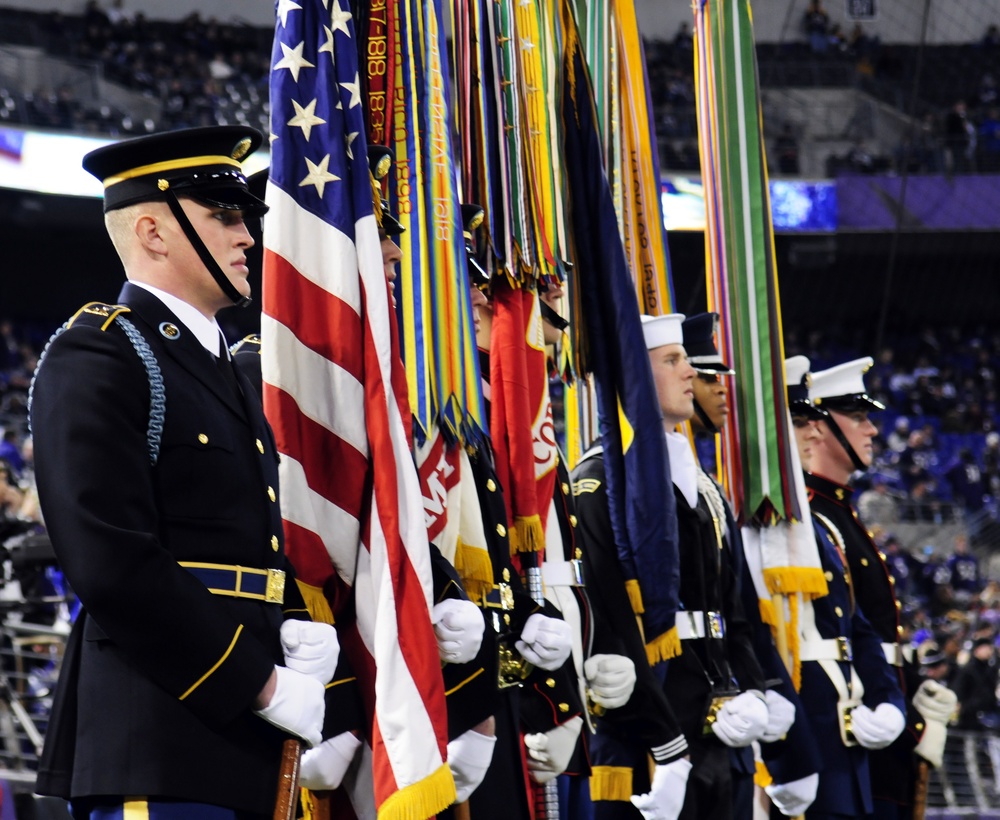 The Veterans Benefits Administration (VBA) helps service members transition out of military service, and assists with Veterans with education, home loans, life insurance and much more. Service members, Veterans, their families, and Survivors are invited to request information on VA Benefits including disability compensation, pension, fiduciary, education, Veteran Readiness and Employment (VR&E), Home Loans, and Insurance. In addition to information on VA Benefits Veterans may initiate an intent to file and request assistance with filing compensation and pension claims. Visit regional office websites to learn about the services the regional office provides, directions to the facility, hours of operation, and the leadership team that serves the regional office.
The Veterans Benefits Administration (VBA) helps service members transition out of military service, and assists with Veterans with education, home loans, life insurance and much more. Service members, Veterans, their families, and Survivors are invited to request information on VA Benefits including disability compensation, pension, fiduciary, education, Veteran Readiness and Employment (VR&E), Home Loans, and Insurance. In addition to information on VA Benefits Veterans may initiate an intent to file and request assistance with filing compensation and pension claims. Visit regional office websites to learn about the services the regional office provides, directions to the facility, hours of operation, and the leadership team that serves the regional office.
Find out if you can get VA health care as a Veteran
The following four categories of Veterans are not required to enroll but are urged to do so to permit better planning of health resources:
- Veterans with a service-connected (SC) disability rated at 50% or more.
- Veterans seeking care for a disability the military determined was incurred or aggravated in the line of duty, but which VA has not yet rated, within 12 months of discharge.
- Veterans seeking care for a SC disability only or under a special treatment authority.
- Veterans seeking health registry examinations. VA’s health registry evaluation is a free, voluntary medical assessment for Veterans who may have been exposed to certain environmental hazards during military service. The evaluations alert Veterans to possible long-term health problems that may be related to exposure to specific environmental hazards during their military service. VA has established several health registries to track and monitor the health of specific groups of Veterans. You may be eligible to participate in one or more of these health registries: Agent Orange Registry, Airborne Hazards and Open Burn Pit Registry, Gulf War Registry (includes Operations Iraqi Freedom and New Dawn), Ionizing Radiation Registry, Depleted Uranium Follow-Up Program, and Toxic Embedded Fragment Surveillance Center. Use the chart below to help determine your eligibility.
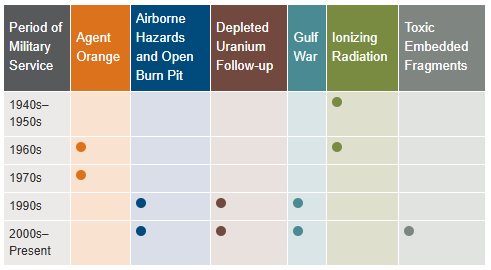
Find out how to apply for VA health care benefits as a Veteran or service member. For other mental health services, contact a VA medical center for information on eligibility and treatment options.
Community Care (Mission Act)
The MISSION Act became law in 2018, bringing the VA’s previous Veterans Choice Program to an end and establishing the Community Care Program. VA provides health care for Veterans from providers in your local community outside of VA. Veterans may be eligible to receive care from a community provider when VA cannot provide the care needed. This care is provided on behalf of and paid for by VA. Community care is also available to Veterans based on certain conditions and eligibility requirements, and in consideration of a Veteran’s specific needs and circumstances. VA offers urgent care services to eligible Veterans at in-network urgent care clinics to treat minor injuries and illnesses that are not life-threatening, such as colds, strep throat, sprained muscles, and skin and ear infections. Community care must be first authorized by VA before a Veteran can receive care from a community provider.
Vet Centers in VISN 20
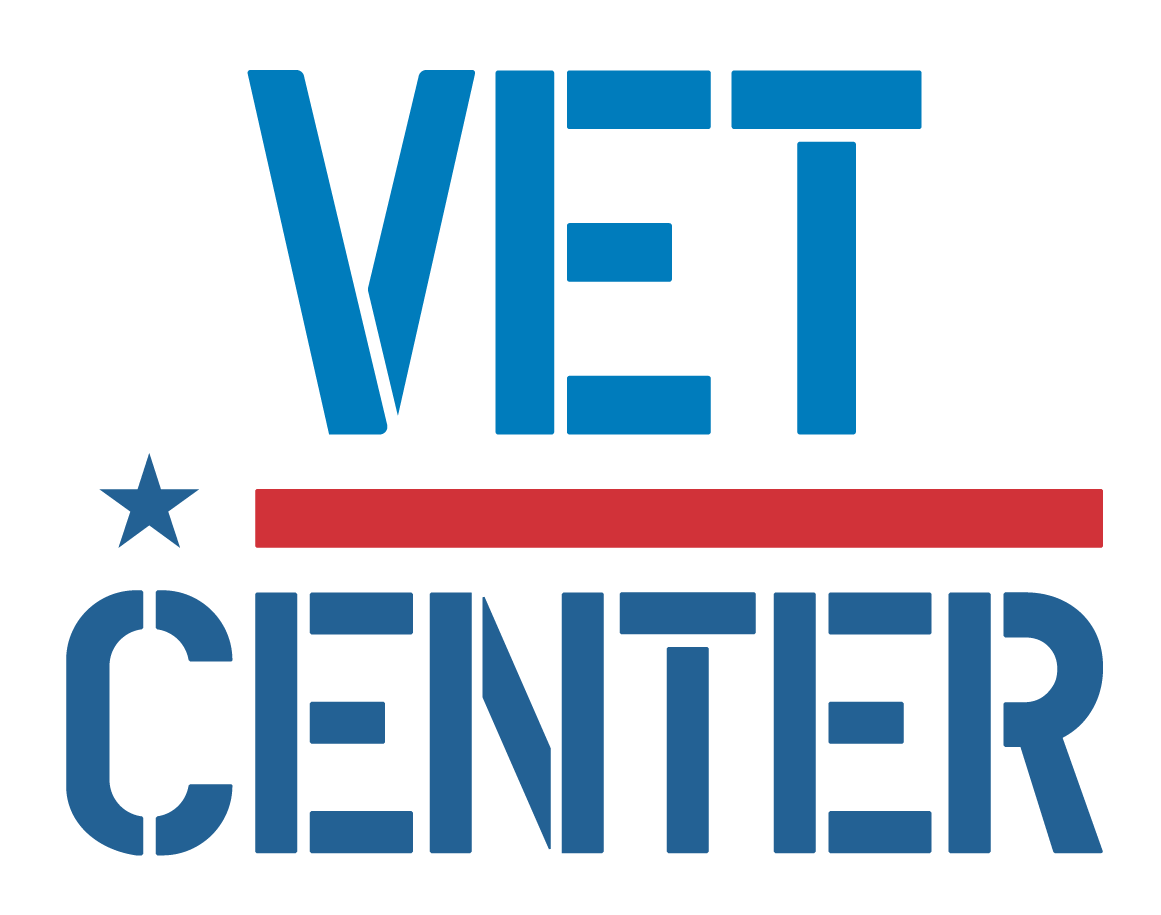 Vet Centers in VISN 20 are community-based counseling centers that provide a wide range of social and psychological services, including professional readjustment counseling to eligible Veterans, active-duty Army, Navy, Marine Corp, Air Force, Space Force, and Coast Guard service members, including National Guard and Reserve components, and their families. 1-877-927-8387 is an around the clock confidential call center where combat Veterans and their families can call to talk about their military experience or any other issue they are facing in their readjustment to civilian life. The staff is comprised of combat Veterans from several eras as well as families members of combat Veterans. This benefit is prepaid through the Veteran’s military service.
Vet Centers in VISN 20 are community-based counseling centers that provide a wide range of social and psychological services, including professional readjustment counseling to eligible Veterans, active-duty Army, Navy, Marine Corp, Air Force, Space Force, and Coast Guard service members, including National Guard and Reserve components, and their families. 1-877-927-8387 is an around the clock confidential call center where combat Veterans and their families can call to talk about their military experience or any other issue they are facing in their readjustment to civilian life. The staff is comprised of combat Veterans from several eras as well as families members of combat Veterans. This benefit is prepaid through the Veteran’s military service.
Alaska
| Anchorage Vet Center (Anchorage, AK) | Fairbanks Vet Center (Fairbanks, AK) |
| Kenai Vet Center Outstation (Soldotna, AK) | Wasilla Vet Center (Wasilla, AK) |
Idaho
| Boise Vet Center (Boise, ID) | East Idaho Vet Center (Idaho Falls, ID) |
Oregon
| Central Oregon Vet Center (Bend, OR) | Eugene Vet Center (Eugene, OR) |
| Grants Pass Vet Center (Grants Pass, OR) | Portland, OR Vet Center (Portland, OR) |
| Salem Vet Center (Salem, OR) |
Washington
Plan your trip to VA
 In 1946, Veterans Canteen Service (VCS) was established by law to provide comfort and well-being to America’s Veterans. With our many retail stores, cafés and coffee shops across the country, we serve those who have served our country. We are a self-sustaining entity providing merchandise and services to Veterans enrolled in VA’s healthcare system, their families, caregivers, VA employees, volunteers and visitors. We are honored to give back to the VA community through many programs established for the health and well-being of our nation’s heroes. Revenues generated from VCS are used to support a variety of programs, such as VA’s Rehabilitation Games, Fisher Houses, Poly-Trauma Centers for OIF/OEF/OND Veterans, disaster relief efforts, Substance Abuse Cessation, VA’s Homelessness initiatives, Women Veterans, Veteran Suicide Prevention and other activities.
In 1946, Veterans Canteen Service (VCS) was established by law to provide comfort and well-being to America’s Veterans. With our many retail stores, cafés and coffee shops across the country, we serve those who have served our country. We are a self-sustaining entity providing merchandise and services to Veterans enrolled in VA’s healthcare system, their families, caregivers, VA employees, volunteers and visitors. We are honored to give back to the VA community through many programs established for the health and well-being of our nation’s heroes. Revenues generated from VCS are used to support a variety of programs, such as VA’s Rehabilitation Games, Fisher Houses, Poly-Trauma Centers for OIF/OEF/OND Veterans, disaster relief efforts, Substance Abuse Cessation, VA’s Homelessness initiatives, Women Veterans, Veteran Suicide Prevention and other activities.
VCS operates over 200 Patriot Stores in Veterans Administration (VA) Medical Centers nationwide. Many of our stores have been recently updated and expanded to provide our customers with a modern, clean and comfortable shopping experience. Our stores welcome our customers with wider aisles, wood-like floors, enhanced lighting and directional signage. PatriotStores have expanded hours of operation to provide service for customers on weekends at most locations.
The Patriot Cafe is the best place in the VA Medical Center to enjoy delicious, freshly prepared breakfast or lunch served hot or cold each weekday. Providing Veterans, their families, VA employees, volunteers and visitors a place to relax and enjoy a meal or take-out for their convenience. With a wide variety of food from traditional comfort food, specialized menu selections and a large assortment of healthy choices; there is something for everyone's taste buds.
Hospital Service Directory
To find out whether there is a van near you use the Disabled American Veterans (DAV) Hospital Service Coordinator Directory to contact your nearest HSC for information or assistance. Please remember that the DAV Transportation Network is staffed by volunteers; therefore, it is unable to cover every community. The vans are driven by volunteers, and the rides coordinated by more than 133 Hospital Service Coordinators around the country. Our nation’s heroes travel around the globe to protect our freedoms—it’s only right that we return their dedication. Volunteering to drive a Vet ensures that even those living remotely from VA hospitals can make their appointments and never go without the treatment they need. Learn more about the DAV transportation network through the VISN 20 NewsFlash Resources section.
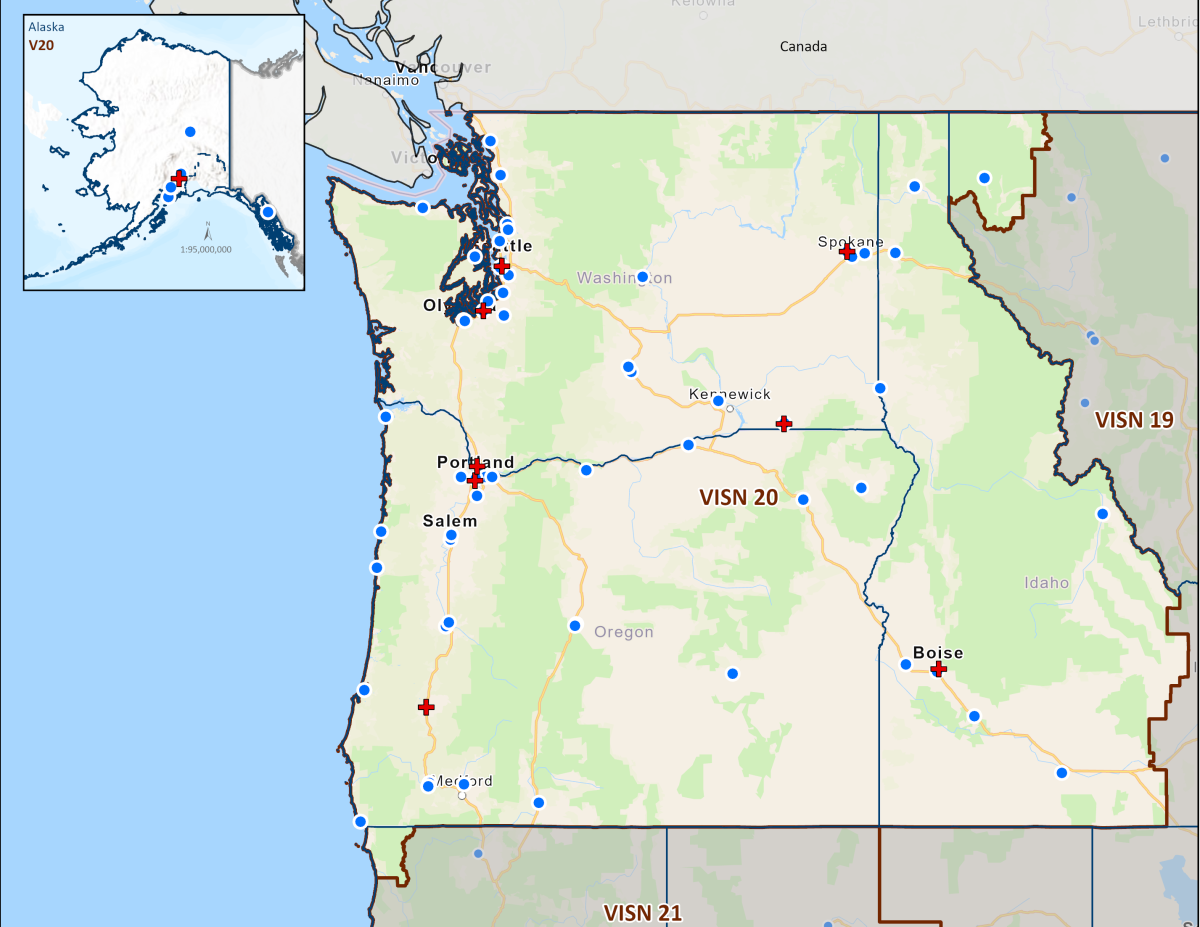 Today's VHA - the largest of the three administrations that comprise the VA - continues to meet Veterans' changing medical, surgical, and quality-of-life needs. VHA is the largest integrated health care system in the United States, providing care at 1,321 health care facilities, including 172 VA Medical Centers and 1,138 outpatient sites of care of varying complexity (VHA outpatient clinics) to over 9 million Veterans enrolled in the VA health care program. There are 18 Veterans Integrated Service Networks (VISNs) in VHA operating as regional systems of care to better meet local health care needs and provides greater access to care. In the Pacific Northwest, VISN 20 serves Veterans in Alaska, Oregon, Washington, most of Idaho, and one county each in California and Montana. Spanning 23% of the US land mass, VISN 20 is the largest geographic region of VA. Operating across three time zones over 817,417 square miles, VISN 20 is home to 273 federally recognized American Indian and Alaskan Native tribes. According to DoD, American Indians and Alaska Natives have one of the highest representations in the United States Armed Forces. VA consults with American Indian and Alaska Native tribal governments to develop partnerships that enhance access to services and benefits by Veterans and their families. VA is committed to ensuring that Native American Veterans and their families are able to utilize all benefits and services they are entitled to receive. As of the end of FY2024, 39% of VISN 20 enrollees resided in rural or highly rural areas.
Today's VHA - the largest of the three administrations that comprise the VA - continues to meet Veterans' changing medical, surgical, and quality-of-life needs. VHA is the largest integrated health care system in the United States, providing care at 1,321 health care facilities, including 172 VA Medical Centers and 1,138 outpatient sites of care of varying complexity (VHA outpatient clinics) to over 9 million Veterans enrolled in the VA health care program. There are 18 Veterans Integrated Service Networks (VISNs) in VHA operating as regional systems of care to better meet local health care needs and provides greater access to care. In the Pacific Northwest, VISN 20 serves Veterans in Alaska, Oregon, Washington, most of Idaho, and one county each in California and Montana. Spanning 23% of the US land mass, VISN 20 is the largest geographic region of VA. Operating across three time zones over 817,417 square miles, VISN 20 is home to 273 federally recognized American Indian and Alaskan Native tribes. According to DoD, American Indians and Alaska Natives have one of the highest representations in the United States Armed Forces. VA consults with American Indian and Alaska Native tribal governments to develop partnerships that enhance access to services and benefits by Veterans and their families. VA is committed to ensuring that Native American Veterans and their families are able to utilize all benefits and services they are entitled to receive. As of the end of FY2024, 39% of VISN 20 enrollees resided in rural or highly rural areas.
VA Medical Centers within VISN 20
Colonel Mary Louise Rasmuson Campus of the Alaska VA Healthcare System, Anchorage, Alaska
VA Boise Medical Center of the Boise VA Healthcare System, Boise, Idaho
VA Portland Medical Center of the Portland VA Healthcare System, Portland, Oregon
VA Roseburg Medical Center of the Roseburg VA Healthcare System, Roseburg, Oregon
VA White City Medical Center of the VA Southern Oregon Healthcare System, White City, Oregon
VA Seattle Medical Center of the VA Puget Sound Healthcare System, Seattle, Washington
Mann-Grandstaff Department of Veterans Affairs Medical Center, Spokane, Washington
Jonathan M. Wainwright Memorial VA Medical Center of the VA Walla Walla Healthcare System, Walla Walla, Washington
VA Puget Sound Health Care System (VAPSHCS) serves Veterans from a five-state area in the Pacific Northwest with two main divisions: American Lake VA Medical Center and Seattle VA Medical Center. Veterans Medical Centers are also located in Spokane, Vancouver, and Walla Walla. VA Outpatient Clinics and Vet Centers are located in Bellingham, Bellevue, Bremerton, Edmunds, Everett, Federal Way, Lacey, Mount Vernon, Olympia, Port Angeles, Puyallup, Richland, Renton, Silverdale, Seattle, Spokane, Union Gap, Vancouver, Walla Walla, Wenatchee, and Yakima.
VA Portland Health Care System (VAPORHCS) serves Veterans in Oregon and Southwest Washington with two main divisions: Portland VA Medical Center and Vancouver VA Medical Center. Veterans Medical Centers are also located in Roseburg, White City, and Vancouver, Washington. VA Outpatient Clinics and Vet Centers are located in Astoria, Bend, Boardman, Brookings, Eugene, Fairview, Grants Pass, Hines, Hillsboro, Klamath Falls, LaGrande, Lincoln City, Newport, Portland, Salem, The Dalles, and West Linn.
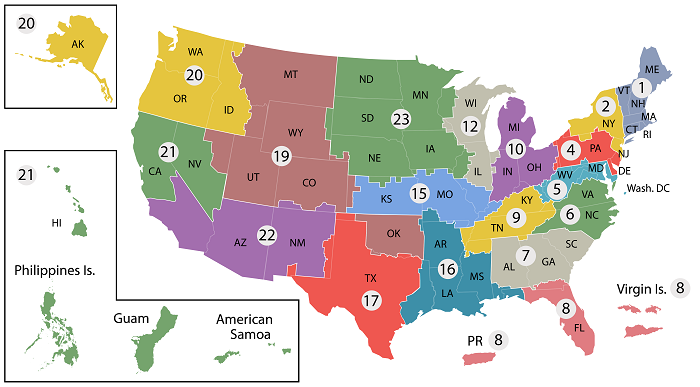
- VISN 1: VA New England Healthcare System
- VISN 2: New York/New Jersey VA Health Care Network
- VISN 4: VA Healthcare - VISN 4
- VISN 5: VA Capitol Health Care Network
- VISN 6: VA Mid-Atlantic Health Care Network
- VISN 7: VA Southeast Network
- VISN 8: VA Sunshine Healthcare Network
- VISN 9: VA MidSouth Healthcare Network
- VISN 10: VA Healthcare System
- VISN 12: VA Great Lakes Health Care System
- VISN 15: VA Heartland Network
- VISN 16: South Central VA Health Care Network
- VISN 17: VA Heart of Texas Health Care Network
- VISN 19: Rocky Mountain Network
- VISN 20: Northwest Network
- VISN 21: Sierra Pacific Network
- VISN 22: Desert Pacific Healthcare Network
- VISN 23: VA Midwest Health Care Network



















